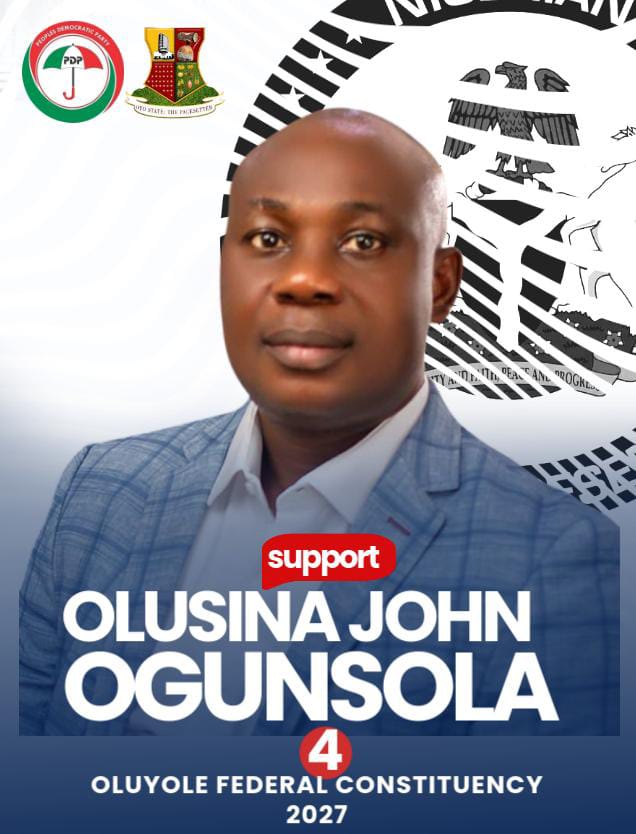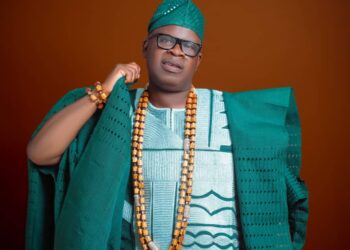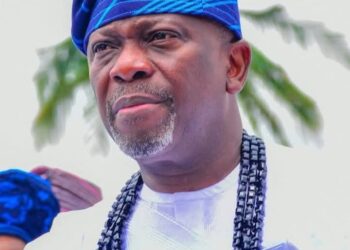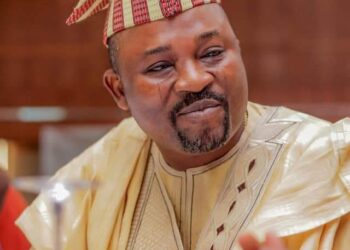Governor Seyi Makinde’s speech while signing the Oyo State Project Monitoring Agency Bill (2024) into law last Thursday was both profound and philosophical. In his remark at the event, the governor said, “People ask me what will be my legacy? Well, our legacy will be the institutions that we are able to create to ensure that Oyo State will continue well into the future to enjoy good governance,” adding that the state does not need a strong governor but strong institutions.
That coming from a governor with a superlative performance across all sectors sounds outré.

Usually for a governor who has invested massively in infrastructure, a governor who has constructed more roads than his four immediate predecessors lumped together, a governor who has expanded the economy and more than doubled the internally generated revenue, a governor who inherited ‘one and a half universities’ and has grown same to three full-fledged universities, a governor who has renovated about 300 Primary Healthcare Centres, a governor who has prioritised workers’ welfare and cleared all inherited salary backlogs and is committed to regular payment of pensions, these would be the obvious choice as legacy. But for Makinde, the legacy is something much deeper than infrastructure; it is the institutions that sustain the infrastructure.
This shows that Makinde is not your next door governor; neither is he your run-of-the-mill governor. He is exceptional, matchless and peerless. He is both forward-looking and forward-thinking.

He is in a class of his own, setting trends and blazing trails all aimed at improving life and livelihood in Oyo State. With his conduct, carriage and culture, Governor Makinde has shown all that there is more to governance and leadership than what we have become accustomed to as a people.


Makinde places institutions above infrastructure as his legacy because of his understanding that the prosperity and wellbeing of a society is bolstered more by institutions than infrastructure. Institutions are the substructure that holds the societal superstructure firmly together. Strong institutions are critical to the sustainability of any society. The strength of a society is determined by its institutions rather than its infrastructure. In the same vein, the prosperity of a society is determined by the strength of its institutions, not its infrastructure. Strong institutions shape the character of citizens, foist on them acceptable norms and forge in them desirable mores. While it is great to have both strong institutions and great infrastructure, when push comes to shove institutions will always trump infrastructure because great infrastructure can be reduced to rubble by weak institutions.
Weak institutions are Nigeria’s albatross. Weak institutions have vitiated Nigeria’s growth and development because weak institutions permit misconduct, overlook corruption, encourage complacency and tolerate nepotism. Weak institutions discourage best practices, so they give fillip to those in the corridors of power to game the system. This is why Nigeria, despite being an immensely endowed country, is home to 133 million multidimensional poor people. It is also the reason behind the failure of many government programmes and projects. The existence of weak institutions in Nigeria is the cause of the rising underdevelopment in the country. It is the reason for the escalation of insecurity and criminality. Therefore, weak institutions are the antithesis of greatness.
So, the question is if it is so glaring that weak institutions stalls development why is it difficult for Nigeria to build strong institutions?

The answer is not shrouded in any mystery, it is because strong institutions will expose the weakness and incompetence of our leaders and many of them will give an arm and a leg to ensure that never happens. So, the motivation to keep up propping weak institutions is quite high.

The fact is that many Nigerian leaders are integrity deficient, morally bankrupt and primordially sentimental. They worship at the altar of lust, offer sacrifices at the temple of perfidy, pay obeisance to the god of self-indulgence and genuflect to tribal and religious demons.
They fail to understand that occupants of high offices should be above board. A leader that will build strong institutions must understand the demands and responsibility of high office.
Paradoxically, while weak institutions protect corrupt and weak leaders, strong institutions are the bulwark of the society and its systems.
So, there is no incentive for weak leaders to build strong institutions; it will be self-defeating. A man’s action is a reflection of his conviction; a corrupt man cannot crusade against corruption; a weak leader cannot advocate strong institutions.
One way to strengthen institutions is to build an effective justice system such that anyone caught acting contrary to the laws of the land finds no shield anywhere.
Another way is to put in place a structure that makes it almost impossible for infractions to occur, thus dissuading citizens from toeing the wrong path. Neither will happen naturally; they will happen only when political leaders, especially at the highest level of government, are courageous enough to step on toes and punish every breach. But how can leaders with soiled hands come to equity?
Building strong institutions starts with a determined leader who is able to say no to his personal weaknesses and is ready to curb the people’s excesses.
The institutions initially will require the protection of the determined leader from manipulation but eventually they get so strong that they no longer need the shield. Then, on their own, the institutions can defend the people’s patrimony without being at the mercy of a few persons, including the benevolent leader.
In spite of the massive decadence in the country, Governor Makinde is determined to change the narrative in Oyo State by putting in place structures and institutions that would make the state an oasis in Nigeria.
The point must be underscored that it is only leaders who are strong in integrity and hoard no skeleton in their closets that can promote strong institutions. That Governor Makinde is emplacing strong institutions to protect the people’s commonwealth speaks to his character and integrity.
Over the past five years, Makinde has put in place some agencies to strengthen the system and secure the people’s patrimony in Oyo State.
He started with the Oyo State Anti-Corruption Agency (OYACA), which came into existence on December 10, 2019. The agency’s raison d’être is to plug revenue leaks from the government coffers and stop the act of mismanagement of office by public office holders and government workers. The law setting up the agency frowns at monies, fees, donations, loans or gifts given or promised to be given as consideration for the performance of a public administrative duty.
OYACA has spread its tentacles to every nook and cranny of the state, doing all in its power to tame the demon of corruption.
A couple of weeks ago, Governor Makinde signed an Executive Bill establishing the Oyo State Rule of Law Enforcement Authority. While explaining the rationale behind the new body, the governor said the whole essence of the Authority is to facilitate quick dispensation of justice.
The governor had said, “We have been here for over four years and we have seen that we do have adequate laws to deal with in the aspect of protecting the environment, traffic laws, and road transport management authority.
“We also signed the anti-open grazing law but some of these we have not been able to enforce, maybe because we have not had full cooperation from the law enforcement agencies.
But we have to keep striving for the kind of state that we are all comfortable with and we have been dreaming about.”
He added, “I have had to deal with people driving against traffic, leading to maiming, even death. We have had several instances of deaths. We have had to deal with street trading. People have also turned the median of our road to dumpsites.
“Yes, we have been saying these things must stop and, in reality, they must stop. So, what this law is going to do is to allow quick dispensation of justice. That is why with the signing of this law; we will put everything in place to give a bite to the people that will run this authority.”
Then last week, Makinde signed the Oyo State Project Monitoring Agency Bill into law for the primary purpose of extracting values for all projects in terms of schedule and quality.
This is to ensure that projects are delivered on time and as expected, to guard against the state or the people being shortchanged.
With these three agencies, come two things. First, gaming the system will become herculean because criminally-minded elements have to work super hard to beat the structure in place in the state.
Two, those who manage to beat the system will have their rendezvous with justice when found out; those who do the crime in Oyo State will do the time in prison, those who break the law will face its wrath.
The tripod of Oyo State Project Monitoring Agency, Oyo State Rule of Law Enforcement Authority and OYACA will tighten the noose on those who may be tempted to work against the interest of the state be they contractors, civil servants, political appointees, traffic offenders, facility vandals, traders or those who engage in indiscriminate waste disposal.
With these three agencies, Governor Makinde has put in place structures that will guard against the resources of the state being plundered, projects being poorly executed or abandoned, the people becoming lawless and the society going to the dogs, thus preparing the state for an upgraded lifestyle which will definitely culminate, a few years from now, in Oyo State being ranked among the best sub-nationals in the world. When that happens, the credit will go to Makinde, the governor who saw the need for emplacing strong institutions to birth good governance and state-wide development.
Olanrewaju is the Chief Press Secretary to Oyo State Governor.


You can get every of our news as soon as they drop on WhatsApp ...To get all news updates, Join our WhatsApp Group (Click Here)
















